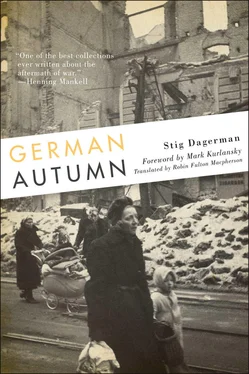The lawyer: ‘But Party members did it voluntarily.’
The soldier: ‘The responsibility is not ours, it doesn’t lie with the young people.’
The lawyer: ‘Never before in Germany has there been a party which demanded of its members that they should sign an undertaking of unqualified obedience.’
Excited voices: ‘No? Herr Staatsanwalt, look at today’s democratic parties!’ (These youngsters are in fact quite honestly convinced that membership of a party unconditionally entails the duty of obedience towards a leader.)
The lawyer: ‘It was an outrage, something unpardonable, a punishable offence, which today can be rewarded with six months’ imprisonment, and for officials up to five years.’
Excited voices: ‘No one told us that. We were fourteen then, Herr Advocat.’
The lawyer: ‘I have spoken with people who have more experience than you have and they were appalled that this could happen. Each person who has signed the undertaking of obedience has put himself in a perilous situation. You can be grateful that the Allies have come here. Would it be better if there had been a revolution and you had lost your heads?’
The rich young fellow: ‘Then we wouldn’t need any vitamins, Herr Staatsanwalt!’
The lawyer: ‘The law is a piece of good luck for you as former National Socialists. The law is mild since it takes account of youth, and youth, I may add, does not involve freedom from responsibility. You are responsible in the same way for a flower-pot that tumbles down from your window-ledge.’
The student: ‘Herr Advocat, let me say that you, the older generation, who kept silent are responsible for our fate in the same way as a mother who lets her children starve to death.’
The lawyer: ‘You know that those of you who were born after 1919 can be given an amnesty — that is, if you don’t belong to the most tainted category — those who made themselves guilty of maltreatment and violence. Besides, we who are older must also admit that Nazism did not deal improperly with youth. There are young people who look back with joy to their Hitler Youth days.’ (Murmurs of agreement.) ‘And one must remember as well that there was a dictatorship not only in Germany, but also in Turkey, in Spain and in Italy.’
‘Don’t forget Russia, Herr Advocat,’ someone calls out, then quotes word for word from a Churchill speech about Russian politics, ‘In that respect even the Nazis fell short.’
The lawyer: ‘The law applies to the entire population. It’s not a matter simply of paying a fine of a couple of thousand marks and being done with it. A mental readjustment is demanded, on the part of the younger generation as well. Don’t say any longer “We can’t do anything”, no matter how true it may be that no group of young people have been treated worse than you have been.’
Middle-aged SS man: ‘The first sensible word this evening!’
The lawyer: ‘The young and the old are in the same boat. Do we have a chance of bettering our lot?’
The audience: ‘Yes, we have — through us.’
The lawyer: ‘Do you think that the politicians in Paris can help us, running from one conference to the next without anything being achieved? It’s we who have to help ourselves. We must have patience. It was not only Germany that had unemployment in 1933, but it was Germany that had no time to wait. Now we must learn patience, for reconstruction needs patience.’
The Chairman: ‘Herr Advocat, weren’t we young people in the Hitler years inspired with a will to construct?’
The SS man: ‘We were idealists, Herr Staatsan-walt. We demand an amnesty for SS men. Everyone here knows how a young fellow became an SS man. Someone said “Karl, you’re a fine tall chap, you’re for the SS” — and so Karl was in the SS. Everyone fights for his country and regards that as something creditable, so why should we be punished for having fought for our Germany?’
The lawyer: ‘We lawyers are bound to our professional duty. The denazification law is our employer. Even I myself am slowly coming, it seems, to be regarded as nazified. The Americans have taken my house, my furniture too. So blame the law, not die Spruchkammern. Remember that we older people did not have a much easier time than you did. For twelve years we stood with one foot in the concentration camp and for the last six years the threat of bombing was over our heads both day and night. Not just youth but the whole German people are sick: sick of inflation, reparations, unemployment and Hitlerism. That’s too much for a people aged twenty-five. We lawyers have no prescription for recovery. We can do only one thing: try to apply the most lenient interpretations of the law, try to move the most tainted into the group of the less tainted; and be certain that we are doing all we can. We are doing our utmost for the younger generation, but in the first instance we are lawyers and according to the terms of the capitulation we cannot refuse to take due notice of the laws governing denazification.’
And with this apologetic flourish the old lawyer concluded. He should have held an introductory address which without any discussion ought to have brought him thus far, but he was not able to hold out against the vehement opposition which kept invading his carefully composed speech and breaking it apart. It was fascinating to observe how this practised and well-bred man simply did not dare to use the customary style of parliamentary retort against this excited opposition. In fact we often meet in the older generation a physical dread of youth and this is one of the reasons why the older ranks of political and public life deal so restrictively with youth and at a safe distance.
In the following discussion the young audience listened without interest as the SS men spoke about the bloody First of May in 1929 and about the bloody internecine strife among the parties of the left. The student-lawyer had a special problem. His ‘taint’ lay ten years back in time. He had become a Pg (Partei genosse, Party member) in 1936 at the age of twenty-three and then in maturer years had ‘denazified himself, but now he was being summoned to appear. The lawyer replied that of course it would be desirable if all young people were to receive individual treatment but that nothing could now be done about that.
The student: ‘We young lawyers were forced to join the Party. Who would have helped us if we had refused? Many young lawyers in Hessen have now been put on the street with their families and left to whistle for work. Without the younger generation there is no democracy, but if we are treated like this then we just lose all interest in doing anything at all for democracy.’
At this stage the rich young fellow brightens up and calls out ‘Bravo!’ The lawyer consoles his young colleague by pointing out that only the accused of Class One, that is, war criminals, can be punished with exclusion from work, but a young woman protests and claims that employers who have perhaps themselves been Pg turn up their noses when they hear that an applicant for a job is a young Pg. These employers are afraid of the newly introduced management councils, representing the new industrial democracy, which she maintains are much worse than die Spruchkammern.
And she is no doubt right. The whole of Germany either laughs at or weeps over this business of denazification, this comedy where die Spruchkammern play a lamentable double role as the friend in need, those courts whose lawyers apologize to the accused before judgement falls, these enormous paper-mills where it can happen that an accused person in this Germany of paper shortages turns up with a hundred testimonials proving his unimpeachability and wades through thousands of meaningless and trivial instances while the really important instances somehow vanish through a secret trap-door.
Читать дальше












